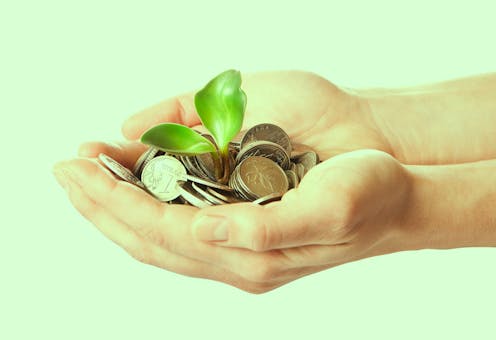
The term impact investing first appeared in 2007 at a Rockefeller Foundation meeting. It is defined as an investment with the intention of generating a positive social and environmental impact as well as a financial return.
Supported by powerful institutional actors at the international level (G8, OECD and UN), impact investing is growing. At the end of 2020, the size of the market was estimated at US$715 billion by the Global Impact Investing Network (GIIN), a network of actors considered to be a major player in the impact-investing ecosystem.
A complex ecosystem
Impact investors are generally divided into two main types: private impact investors (PIIs), which include foundations or third-party investors such as private equity funds, pension funds and other institutional investors, and development finance institutions (DFIs), which are government-backed financial institutions.
On the demand side, the actors are social enterprises, cooperatives, for-profit enterprises with a social mission and non-profit entities that require capital to develop from a social or environmental perspective. They range from small to large entities. For example, in the Philippines, many for-profit social enterprises are developing, such as Filipina Home-based Moms, an organisation that trains mothers in digital skills to help them prepare for online jobs. In another area, Futuristic Aviation and Maritime Enterprise is developing a transponder that tracks small fishing boats at sea to increase the safety of fishermen.
GIIN estimates that achieving the UN Sustainable Development Goals (SDGs) by 2030 in emerging countries will cost about US$2.5 trillion per year. Once reserved to the public sector, the area of social enterprise is now increasingly attracting private capital, enabling governments to make progress toward SDGs.
Our recent research on emerging Asia details the key challenges impact investing still faces today if it is to be effective.
First challenge: mitigating country risk
An appropriate governance framework, including effective public administration, respect for the rule of law, low levels of corruption and transparency in business procedures, is necessary for impact investing to develop, as it helps to reduce country risk for investors.
The OECD proposes a framework as a tool for governments, and the first step is to define impact investing’s legal framework. For example, the Philippines and Thailand have done this by adopting a legal definition of social enterprises. In contrast, the Indonesian government’s failure to define impact investing may have been an obstacle to its development.
Challenge two: developing non-financial intermediaries
In order to achieve a mutual understanding between impact investing’s supply and demand sides, exchanges of knowledge and experience are essential to highlight what works and what does not and to ensure that appropriate incentives are in place on both sides.
On the demand side, investment funds, contract development and management skills support structures are increasingly used to support the emergence and growth of social entrepreneurs. In addition, there is a need for local enterprises to better understand the rules of the game. The exchange of good practice can be very helpful. This is why networks are essential to match supply with demand.
The Asian Venture Philanthropy Network (AVPN) is a good example of such a network. There are also American accelerators such as Dao Ventures, or the Rockefeller Foundation.
Challenge 3: Measuring non-financial impact
Evaluating the impact is difficult both in terms of measurement and in terms of impact-investing data. Some of these difficulties are not new. The social impact of microfinance has been the subject of much debate. Some progress has been made in this area with the development by the GIIN of the Impact Reporting and Investment Standards (IRIS), a catalogue of performance metrics used by impact investors to measure the social returns of their investments.
These metrics are one of the first tools for investors to measure and compare across investments or portfolios. There are also alternatives such as the Acumen Fund’s Lean Data methodology. However, there is consensus about the many limitations of existing measurement devices.
Specific approaches
The same issues that are at stake in developed countries – standardisation of procedures, transparency, the danger of “impact-washing” – also exist in emerging countries but with some specificities.
First, standardisation must be tempered by the need for specific (local and idiosyncratic) approaches. Otherwise, it can impose on companies approaches that do not allow for proper development management and are resource intensive.
Second, the challenges of transparency need to be balanced against the issue of political power, as the challenges of transparency differ between democratised and non-democratised countries. The challenge of measuring impact concerns all countries, but in a sense it is accentuated for emerging countries because of the inadequacy of information systems and because social impact is more important than environmental impact and the difficulties of measurement are more numerous.
The authors do not work for, consult, own shares in or receive funding from any company or organization that would benefit from this article, and have disclosed no relevant affiliations beyond their academic appointment.
This article was originally published on The Conversation. Read the original article.







